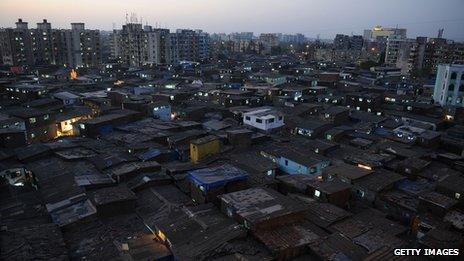India: One billion opportunities
- Published

Mumbai hosts the India Economic Summit where delegates discuss issues such as inclusive growth
For the first time in its 27 year history, the World Economic Forum's India summit has moved away from the capital, Delhi.
But while Mumbai may be making its debut as host of the India Economic Summit, the topics dominating the agenda are old favourites.
Inclusive growth, the development of rural economies, internal issues such as inflation and the new cause celebre, corruption, have all been discussed.
What is new this time round, however, is the level of interest in how India deals with these topics, not least because the country is playing a greater role on the global stage.
Ben Verwaayen, co-chair of the Mumbai summit, explains that with more time in the international spotlight, there also comes greater expectations from India's partners and population.
They want to see changes take place and they want to see it happen as quickly as possible.
"You cannot afford to be parochial for your own interests. You now also have to participate in what is good for the world as a whole," Mr Verwaayen explains.
"That is what happens if you get to the table where the decisions are made. So the expectation now is that you have a conversation that says what is good, what is necessary and how do we get there."
But change, especially quick change, is not always easy in a country of more than a billion people, with a system of governance that is slow and creaking.
However, according to one of the biggest names speaking at the summit, India has already made a dramatic shift that will stand it in good stead.
Mukesh Ambani is the billionaire chairman of Reliance Industries, a sprawling conglomerate that sits at the very heart of India's economy.
Speaking on Sunday, Mr Ambani said that the India of today is a different place to the country that began the process of economic liberalisation and reform 20 years ago.
In the past, India's economy was steered by the government. Today it is led much more by its citizens.
"What has happened in the last 20 years is that the energy of all sections of Indian society has been unleashed to build a new India," Mr Ambani said over the weekend.
And while there is still a long way to go, he is confident this shift should help India overcome many of its internal issues and help speed development.
The BBC's Nidhi Dutt says there's been a reflective mood among delegates on how India can continue reforming its economy to grow in a sustainable way.
Correcting corruption
Many people at the summit said the fight against corruption was one example of what could be achieved.
For months, the topic has dominated discussion in India, from the alleged misallocation of second generation phone licences, to suspected illegal mining.
While progress may seem to be slow, light is steadily being shed on murky business practices across a range of industries.
According to delegates, there is a growing recognition within India that corruption makes the country look unstable and unattractive to the international business community.
Huguette Labelle, chair of Transparency International, says that corruption is an issue of international significance that affects both rich and poor.
"When there is a major scandal, of course, it brings the world's attention to a country. But what is important is that when these scandals happen that they are discovered, that they are investigated, and that justice take its course," she explains.
Government plans
In the face of public protest and pressure, the Indian government says that it is in the process of delivering change and cleaning up corruption.

Alleged corruption led to many protests in India
At the BBC debate on the issue, Ashwani Kumar, minister of state for planning, science, technology and earth sciences, said that several measures have been announced to tackle corruption.
According to the minister, the government will propose seven bills in the forthcoming session of parliament. They will include further protection for those who report acts of corruption.
For many delegates, this sort of change will be vital if India wants to maintain its high growth, not least because social and domestic stability are vital components of any development plan.
As a result, there have been repeated calls for India to increase efforts to tackle the other domestic problems it faces, such as high inflation, rising interest rates and weakening domestic demand.
Delegates insist that when it comes to expectations about development and the future, there is an urgent need for those at the helm to meet the needs of the population, ideally before those of international investors and leaders.
As one delegate commented, everything in India is about big numbers, both good and bad.
The trick now will be making sure that India is a land of more than a billion people with opportunities, not problems.
- Published2 October 2011
- Published28 September 2011
- Published21 October 2011